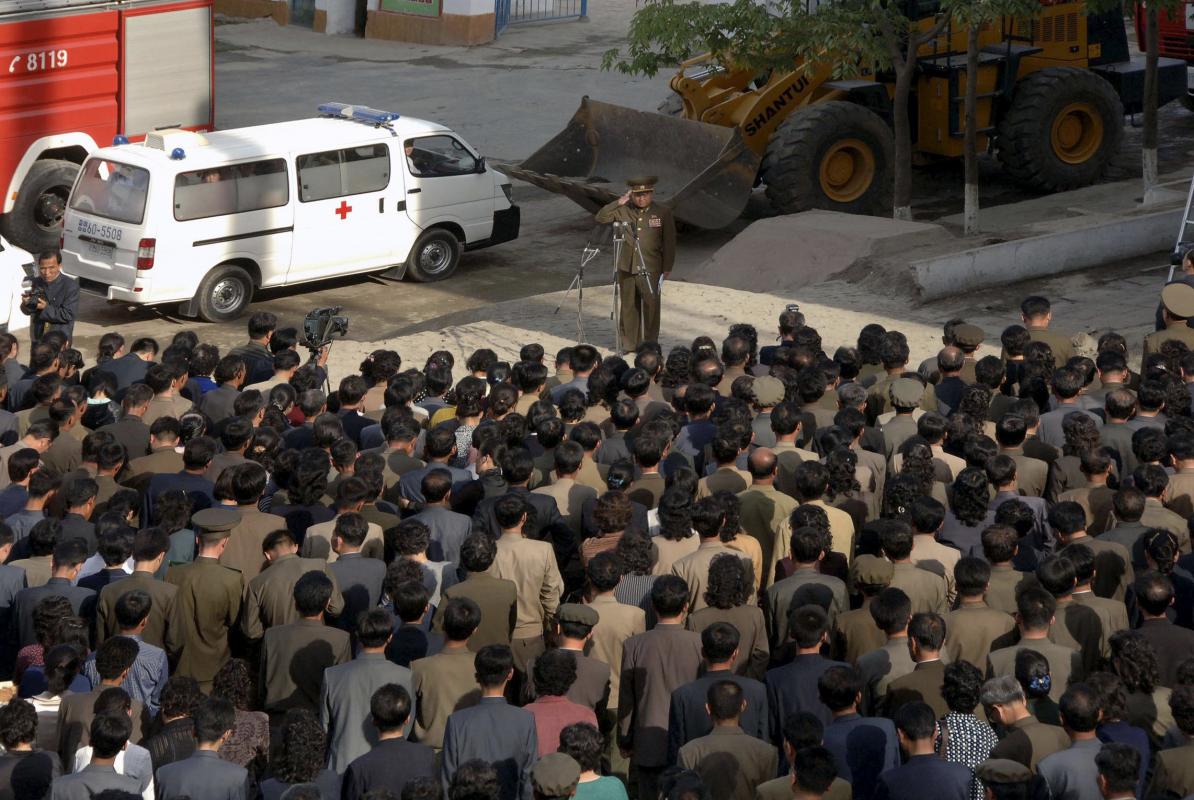When A Building Falls ...
"As with everything in North Korea, this is all about establishing Kim Jong Un's legitimacy."
"Even when a building collapses, they're thinking about how to use it to consolidate his power."
John Delury, North Korea/china specialist, Yonsei University, Seoul
"If news starts spreading, it usually does so very slowly. It's the world's most controlled media. End of story."
Andrei Lankov, North Korea expert, Kookmin University, South Korea
 |
| In this Saturday, May 17, 2014 photo released by the Korean Central News Agency (KCNA) and distributed by the Korea News Service, a North Korean official, center, salutes while apologizing in front of families of victims of an accident at an apartment construction site and local residents in Pyongyang, North Korea. North Korean officials offered a rare public apology for the collapse of the apartment building under construction in Pyongyang, which a South Korean official said was believed to have caused considerable casualties |
A city is not a forest where, when a tree comes crashing down the question can be legitimately asked, does it make a sound if no one is around to hear it? Well, it does make a sound consonant with the impact it creates when a massive wood club hits the ground or other trees around it. Just, as it happens, no one knows but the wildlife, and they aren't talking.
In Pyongyang, on the other hand, there are plenty of people around. Hundreds of foreigners live in the city, though heaven knows why. A few international news bureaus operate in the city, including The Associated Press. As unlikely as it might seem, a steady procession of tourists visit, as well as academics and diplomats. There's just no accounting for some elements of human society.
While over two million people in the North have cellphones, there is no Internet access. Local media publish at government's instruction. The security establishment curbs both citizens' activities and those of foreigners. But is it possible that either citizens or foreigners present in the city would not know that a 23-storey apartment building collapsed in the capital city last week?
Three days after the disaster a state-operated newspaper boasted a photograph of Dear Leader, grinning ear to ear as he watched a soccer match. On a screen display of a telephone beside Kim Jong Un was the date; one day after the occasion of the collapse. And that news outlets were finally authorized to make note of the building collapse days later owed to the inevitability of spreading rumours.
North Korean leader Kim Jong un (2nd L)
visits the Taesongsan General Hospital in this undated photo released by
North Korea's Korean Central News Agency (KCNA) in Pyongyang May 19,
2014.
Credit: Reuters/KCNA
|
To take charge of the situation and own the event, the story, when it was eventually published five days later, made more of the public anguish of a grieving Kim Jong Un than the full weight of the catastrophe. One official took pains to stress through state media that the nation's idol "sat up all night, feeling painful after being told about the accident."
And while the state-run Korean Central News Agency admitted that casualties occurred, no specifics on deaths or injuries were stated. South Korean officials, on the other hand, believe many people died since about one hundred families had in all likelihood moved into the building, even while it remained under construction.
All's well, however since apologies were given from five officials accepting responsibility for the collapse.
Labels: Catastrophe, Communication, News Media, North Korea

<< Home